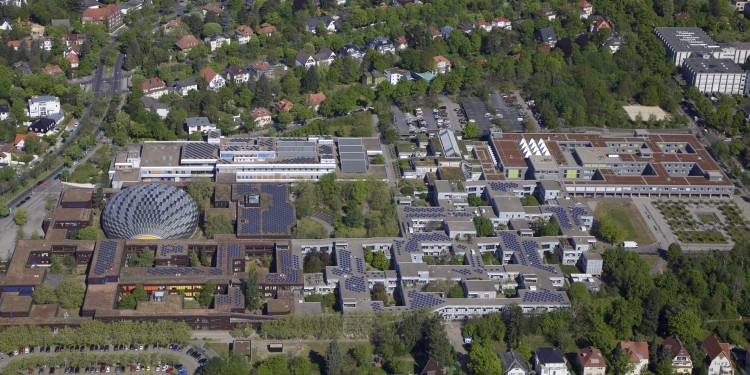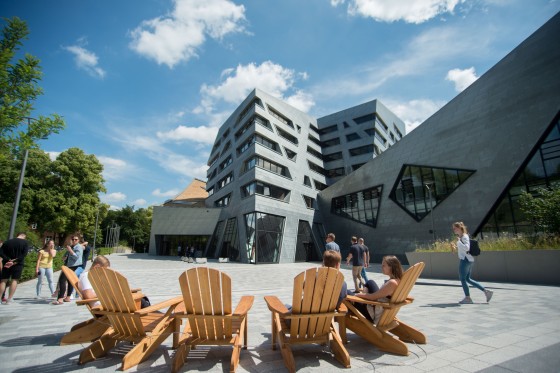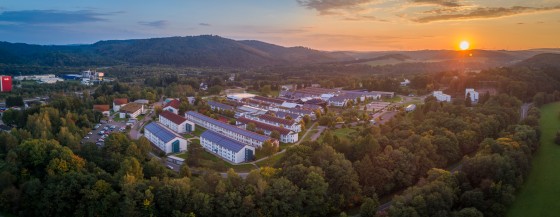
Academic green fingers
Fridays for Future, plastic in the oceans, renewable energies, ecology-friendly consumption: sustainability is a much-discussed issue. We should handle natural resources with care and we should not live at the expense of people in other regions or of future generations. Research at the University of Münster can make its own contribution to this. In this dossier over the past six months, the Communications and Press Office at the University has shed light on the issue of sustainability, and its many facets, and on the challenges it entails. To round off the series, we look further afield, beyond Münster University.
“Our aim is carbon neutrality for our university by 2025”
A current survey at the Freie Universität Berlin shows that 37 percent of all research projects and 16 percent of all teaching address issues relating to sustainable development in the sense of the Sustainability Goals adopted in 2015 by the United Nations. This shows that these goals are having a clear impact on the core sector of the university.
The university’s social responsibility for sustainable development goes beyond research and teaching, however, and encompasses the entire institution. The Freie Universität Berlin faced up to this responsibility at a relatively early stage. By means of a package of various measures, it succeeded in reducing energy consumption on the campus by 27 or (excluding the growth in area) 29 percent between 2000 and 2019. If we include the fact that – following a resolution by the Berlin Parliament – the university has been sourcing CO2-free power since 2010, the reduction in campus-related CO2 emissions actually amounts to 80 percent.
However, the university has no desire to rest on its laurels. In December 2019, it was the first German university to declare a climate emergency – allied to the target of achieving carbon neutrality for the university by 2025. As this target also includes greenhouse gas emissions resulting from business trips – which account for at least one-third of overall emissions – the university has an ambitious task on its hands.
The university will continue to systematically pursue its activities on energy efficiency, taking measures to limit air travel. In addition, the university will have to find answers to the question of how the generation and sourcing of renewable energies can be significantly expanded. Compensatory mechanisms will also have to be introduced which can stand up to any criticism from students and researchers. This has a greater chance of succeeding if the university manages to pool its sustainability competences in research, teaching and administration.
Author Andreas Wanke heads the Sustainability and Energy Department at the Freie Universität Berlin
“The issue of sustainability is top of the agenda”

Projects such as “Carbon-Neutral Campus”, the switch to low-carbon power, the use of sustainable office materials, and a voluntary eco-management system in line with EMAS (Eco-Management and Audit Scheme) are less obvious, but they are just as much part of the comprehensive sustainability concept as are relevant undergraduate courses and research projects. The “Zeit Wissen” magazine and the “Mut zur Nachhaltigkeit” initiative (“A Sustainable Future”) were not alone in acknowledging this successful integration of the idea of sustainability into all areas of academic life when they awarded a prize to the university for innovative eco-management: awards were also recently received from the German Ministry of the Environment and the German Association of Chambers of Commerce and Industry.
As a result of its own projects, Lüneburg University has been carbon-neutral since 2014 and does not therefore need any more CO2 neutralisations. All emissions from business trips, university vehicles, and the use of power and heating are avoided or offset. This was achieved by carbon-neutral energy supplies, as well as a saving of 50 percent of primary energy and 30 percent of final energy. Only a few of the more than 500 universities in German-speaking countries have documented their own development from the point of view of sustainability. Lüneburg University has already published its sixth sustainability report. This reflects the continued development of the principle of sustainability in all areas of the university – from research to campus design.
Innovative teaching, projects, conferences and initiatives in university administration all show why Lüneburg University is seen as exemplary as regards dealing with sustainability issues in the way different disciplines interact with each other.
Author Irmhild Brüggen is the Sustainability Officer at Lüneburg’s Leuphana University.
“Sustainability is the ‘green thread’”

Basing its approach on the Sustainability Guidelines, a Sustainability Council headed by the Sustainability Officer regularly sets new goals. An important provider of input is the students’ Green Office, which, among other things, recently initiated the Fairtrade certification of the Environmental Campus.
Author Prof. Klaus Helling is the Sustainability Officer at the Birkenfeld Environmental Campus
These guest commentaries were first published in the University newspaper “wissen|leben“ No. 4, 16 June 2021.
